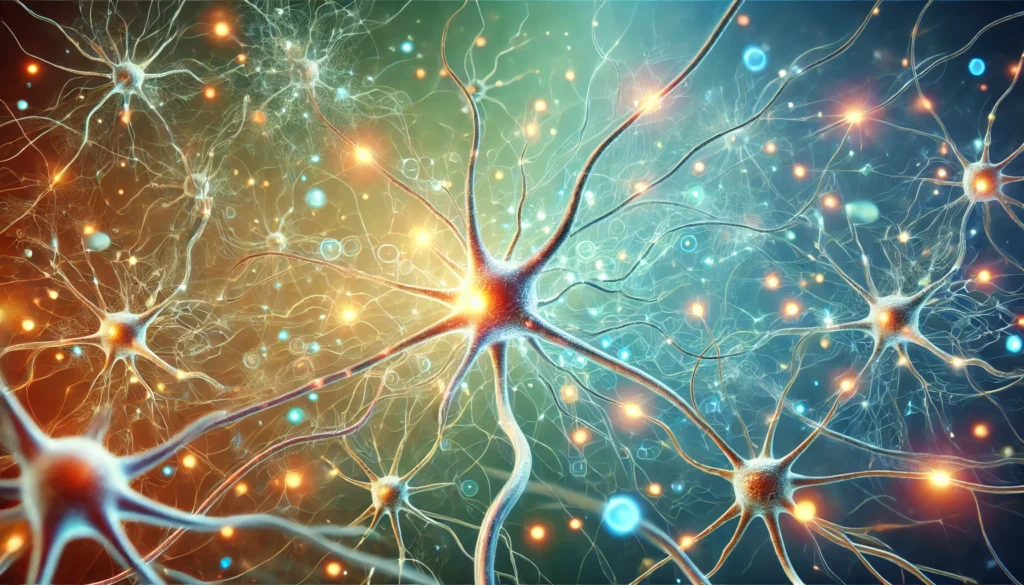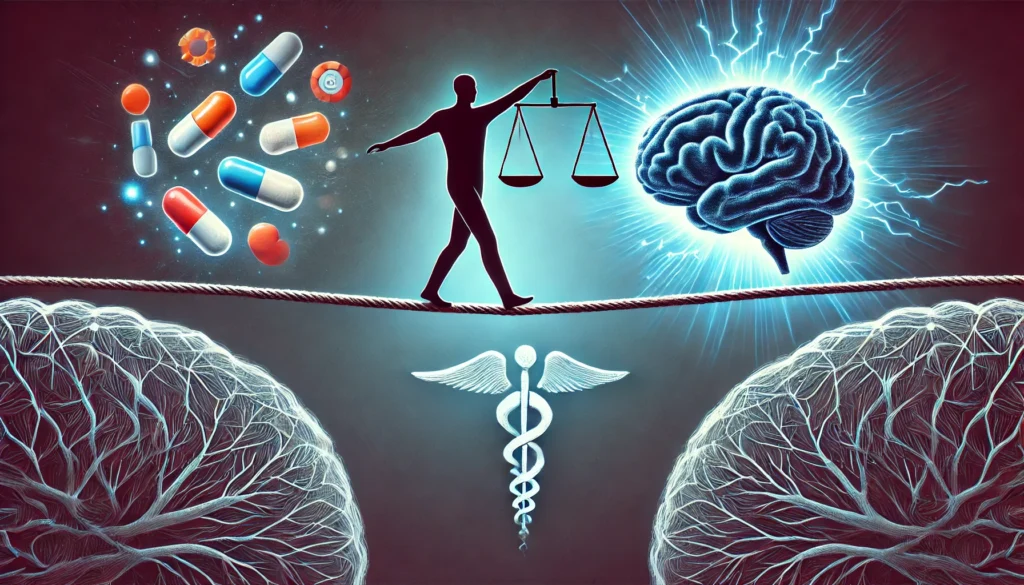This article delves into the potential risks associated with anticholinergic drugs, the symptoms of anticholinergic dementia, and strategies for prevention. We’ll explore the historical context, current trends, and future implications, providing a comprehensive guide for health and wellness coaches, science journalists, and biohackers alike.
You may also like: Understanding the Science Behind Lost Memory
Understanding Anticholinergic Drugs and Dementia
Anticholinergic drugs work by blocking the action of acetylcholine, a neurotransmitter involved in numerous functions including memory and learning. While effective for their intended purposes, these drugs can lead to cognitive decline when used long-term.
Mechanism of Action
Anticholinergic drugs inhibit the activity of acetylcholine, which is crucial for transmitting signals in the nervous system. Acetylcholine plays a pivotal role in processes such as learning, memory, and muscle contraction. By blocking these signals, anticholinergic drugs can disrupt normal brain function, potentially leading to cognitive decline over time.
Historical Context of Anticholinergic Use
The use of anticholinergic drugs dates back several decades, initially prescribed for their effectiveness in treating conditions like asthma, gastrointestinal disorders, and urinary incontinence. Over time, their use expanded to include treatment for psychiatric conditions and allergies. However, the long-term cognitive effects of these medications were not immediately recognized, leading to widespread use without understanding potential risks.
Long-Term Cognitive Effects
Recent studies have highlighted the long-term cognitive effects of anticholinergic drugs, especially in older adults. Continuous use of these medications has been associated with an increased risk of dementia, emphasizing the need for careful consideration and monitoring when prescribing them. Understanding these effects is critical for healthcare providers and patients alike to make informed decisions regarding treatment options.
Do Anticholinergics Cause Dementia?
The question of whether anticholinergics cause dementia has been the subject of numerous studies. Research indicates that prolonged use of these drugs, especially in older adults, can increase the risk of dementia. A landmark study published in JAMA Internal Medicine found a significant association between the cumulative dose of anticholinergic drugs and the risk of dementia.
Understanding this link is vital for managing and mitigating potential risks. For those concerned about dementia symptoms or cognitive decline, recognizing the role of anticholinergic drugs can inform better health choices.
Impact on Different Age Groups
While older adults are at a higher risk, the impact of anticholinergic drugs is not limited to this group. Younger individuals, though less susceptible to immediate cognitive decline, can experience subtle changes in cognitive function over time. It’s crucial to consider age-specific risks and tailor medical approaches accordingly to prevent long-term cognitive harm.
Mitigation of Risks
To mitigate the risks associated with anticholinergic drugs, healthcare providers are encouraged to assess the necessity of these medications regularly. Exploring alternative treatments and implementing personalized medical strategies can help reduce dependence on anticholinergics, thereby minimizing the potential for cognitive impairment.
Identifying Dementia Symptoms and Cognitive Decline
Recognizing the early signs of dementia can lead to more effective management and intervention strategies. Common dementia symptoms include memory loss, confusion, difficulty with communication and reasoning, and changes in mood and behavior.

Early Warning Signs
Early detection of dementia symptoms is crucial for timely intervention. Subtle signs such as difficulty recalling recent events, misplacing items more frequently, and struggling with routine tasks can signal the onset of cognitive decline. Early recognition allows for proactive measures to slow progression and manage symptoms effectively.
Cognitive Assessment Tools
Utilizing cognitive assessment tools can aid in the early identification of cognitive decline. Tests such as the Mini-Mental State Examination (MMSE) and the Montreal Cognitive Assessment (MoCA) provide healthcare professionals with a framework to evaluate cognitive function. Regular assessments can track changes over time and guide treatment decisions.
The Impact of Anticholinergic Effects
Anticholinergic effects can exacerbate these symptoms, leading to a more rapid cognitive decline. It’s essential for individuals and healthcare providers to weigh the benefits and risks of these medications, especially for those already at risk of neurocognitive disorders.
Differentiating Between Dementia Types
Understanding the various types of dementia, such as Alzheimer’s disease, vascular dementia, and Lewy body dementia, is important for accurate diagnosis and treatment. Each type presents unique symptoms and progression patterns, requiring tailored medical approaches to manage effectively.
Behavioral and Psychological Symptoms
Dementia is often accompanied by behavioral and psychological symptoms, including agitation, depression, and anxiety. Recognizing and addressing these symptoms can improve quality of life for individuals with dementia and their caregivers. Interventions may include medication adjustments, therapy, and lifestyle modifications.
Key Strategies for Preventing Anticholinergic Dementia
Preventing cognitive decline involves a multifaceted approach, particularly when anticholinergic drugs are involved. Here are several strategies to consider:
1. Review and Adjust Medications
Regularly reviewing medications with a healthcare provider is crucial. Discuss the necessity of each anticholinergic drug and explore alternatives with fewer cognitive side effects. This process, known as “deprescribing,” can significantly reduce the risk of dementia.
Comprehensive Medication Review
Conducting a comprehensive review of all medications, including over-the-counter drugs and supplements, can identify potential anticholinergic burdens. Healthcare providers can collaborate with patients to prioritize essential medications and eliminate unnecessary ones, reducing overall cognitive risk.
Exploring Alternative Therapies
Exploring alternative therapies and treatments can provide viable options for reducing anticholinergic medication reliance. Non-pharmacological interventions such as physical therapy, cognitive behavioral therapy, and lifestyle changes can effectively manage certain conditions without compromising cognitive health.
2. Lifestyle Modifications
Incorporating brain-healthy habits can bolster cognitive resilience. These include:
- Exercise: Regular physical activity has been shown to improve brain health and reduce the risk of cognitive decline.
- Diet: A diet rich in fruits, vegetables, whole grains, and omega-3 fatty acids supports brain function.
- Sleep: Quality sleep is essential for cognitive health. Aim for 7-9 hours per night.
- Mental Stimulation: Engage in activities that challenge the brain, such as puzzles, reading, or learning a new skill.
Integrating Physical Activity
Physical activity is a cornerstone of cognitive health. Regular exercise increases blood flow to the brain, promoting neuronal growth and reducing inflammation. Incorporating aerobic exercises, strength training, and flexibility exercises into daily routines can enhance cognitive function and delay the onset of dementia.

Nutrition and Cognitive Health
Nutrition plays a crucial role in maintaining cognitive health. Diets rich in antioxidants, vitamins, and minerals support brain function and protect against oxidative stress. Adopting dietary patterns such as the Mediterranean diet or the DASH diet can provide essential nutrients to preserve cognitive abilities.
The Role of Social Engagement
Social engagement is vital for maintaining cognitive health. Participating in social activities, maintaining friendships, and engaging in community events can reduce the risk of dementia. Social interactions stimulate cognitive processes and provide emotional support, contributing to overall brain health.
3. Monitor Cognitive Health
Regular cognitive assessments can help track changes over time and prompt early intervention if necessary. Staying informed about the latest research and trends in cognitive health is also beneficial.
Utilizing Cognitive Tracking Tools
Cognitive tracking tools, such as mobile apps and wearable devices, offer innovative ways to monitor cognitive health. These tools provide real-time data on cognitive performance and alert users to potential declines, enabling timely interventions and lifestyle adjustments.
Research and Education
Staying informed about cognitive health research and developments empowers individuals to make informed decisions. Educational resources, seminars, and workshops can provide valuable insights into dementia prevention strategies and emerging treatment options.
Collaborating with Healthcare Professionals
Collaborating with healthcare professionals, including neurologists, geriatricians, and pharmacists, ensures comprehensive management of cognitive health. Regular consultations and open communication enable personalized care plans that address individual needs and risk factors.
Future Implications and Research Directions
The relationship between anticholinergic drugs and dementia is an evolving field of study. As research progresses, new insights and strategies for prevention are likely to emerge.
Innovations in Pharmacology
Pharmaceutical advancements may lead to the development of new medications with reduced anticholinergic effects. These innovations could offer effective treatments without compromising cognitive health.
Development of Novel Therapeutics
Ongoing research into novel therapeutics aims to develop medications that retain efficacy while minimizing cognitive side effects. Advances in pharmacogenomics and personalized medicine may pave the way for tailored treatments that align with individual genetic profiles and reduce dementia risk.
The Role of Technology
Emerging technologies, such as AI and machine learning, are being used to predict and monitor cognitive decline. These tools could revolutionize the way we approach dementia prevention and management.
AI and Machine Learning in Dementia Research
AI and machine learning technologies are transforming dementia research by analyzing vast datasets to identify patterns and predictors of cognitive decline. These technologies enable early detection, personalized interventions, and the development of targeted treatment strategies.
Wearable Technology and Cognitive Monitoring
Wearable technology, such as smartwatches and fitness trackers, offers new opportunities for continuous cognitive monitoring. These devices provide real-time data on physical activity, sleep patterns, and cognitive performance, empowering users to make informed decisions about their health.
Global Collaboration and Research
Global collaboration among researchers, healthcare institutions, and policymakers is essential for advancing dementia research. International partnerships facilitate the sharing of knowledge, resources, and best practices, accelerating the development of effective prevention and treatment strategies.

Conclusion
Preventing anticholinergic dementia requires awareness, proactive management of medications, and a commitment to a brain-healthy lifestyle. By staying informed and taking actionable steps, individuals can significantly reduce their risk of cognitive decline.
Whether you’re a health and wellness coach, a science journalist, or a biohacker, understanding the implications of anticholinergic drugs is essential. With the right strategies and a focus on prevention, maintaining cognitive health is within reach.
For those navigating the complexities of medication and cognitive health, consulting with healthcare professionals and staying updated on the latest research is paramount. Together, we can combat the risks associated with anticholinergic dementia and promote a healthier, more vibrant future for our minds.
Further Reading:
Cumulative Use of Strong Anticholinergic Medications and Incident Dementia
Do Certain Medications Increase Dementia Risk?
What Is the Link Between Anticholinergic Drugs and Dementia Risk?
Important Note: The information contained in this article is for general informational purposes only, and should not be construed as health or medical advice, nor is it intended to diagnose, prevent, treat, or cure any disease or health condition. Before embarking on any diet, fitness regimen, or program of nutritional supplementation, it is advisable to consult your healthcare professional in order to determine its safety and probable efficacy in terms of your individual state of health.
Regarding Nutritional Supplements Or Other Non-Prescription Health Products: If any nutritional supplements or other non-prescription health products are mentioned in the foregoing article, any claims or statements made about them have not been evaluated by the U.S. Food and Drug Administration, and such nutritional supplements or other health products are not intended to diagnose, treat, cure, or prevent any disease.


